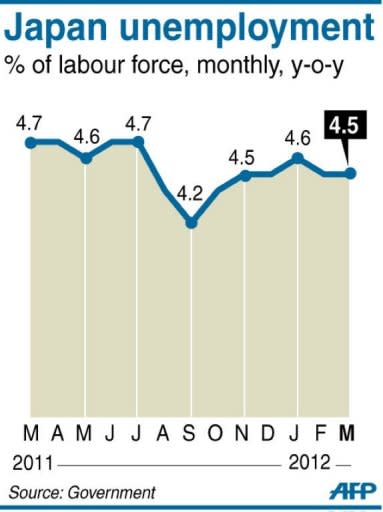BoJ eases further as Japan's economy stands still
Japan's central bank on Friday announced another round of monetary easing in its latest effort to resuscitate the economy after figures revealed a still-weakening fiscal pulse. The Bank of Japan said it would increase its asset purchase programme by 5 trillion yen ($62 billion) to 70 trillion yen and keep interest rates at their super-low levels between zero and 0.1 percent. The latest easing move is yet another salvo in Japan's apparently endless battle with the deflation that has kept a stranglehold on the economy for years. Data showed Friday that prices rose just 0.2 percent on year in March, almost solely due to rocketing energy prices, while unemployment remained static, household spending rose less than expected and industrial remained weak. The BoJ said its asset purchase programme would be expanded to "about 70 trillion yen by around end-June 2013." The move comes after it last month almost doubled a loan programme to 5.5 trillion yen for reconstruction efforts after last year's quake-tsunami disaster, which along with flooding in Thailand battered the economy. The central bank has been forced to resort to the unconventional measure as its ability to free up money has been limited since interest rates were cut to zero to 0.1 percent at the end of 2008 during the global financial crisis. The BoJ said it "expects that, together with the cumulative effects of earlier policy measures, today's decision to further enhance monetary easing will better ensure the return of Japan's economy to a sustainable growth path with price stability". But not everyone was so optimistic. "The economy continues to be at a standstill," said Takeshi Minami, economist at Norinchukin Research Institute. Minami said the economy would likely only gather momentum once the global economy begins picking up, but added that "the worst-case scenario" of Europe's debt crisis hurting emerging markets seemed to have been averted. He noted, however, warned of looming power shortages in Japan as all but one of the country's nuclear reactors remain offline owing to lingering public distrust of the technology after last year's Fukushima crisis at Fukushima. The only active one is due shut down on May 5. "It could damage supply when exports and reconstruction demand are growing toward summer. There are risks of its putting a damper on the economy." Japanese power companies have warned a hot summer could bring blackouts for some areas unless nuclear plants are re-started. An indication of the hill Japanese policymakers must climb came in the figures released hours before the BoJ move. While falling prices may be good news for individual consumers, they are bad for the economy as a whole because they encourage shoppers to put off purchases in the hope they will pay even less for goods in the future. This cuts into corporate profits and stops firms investing in capital and employees because they are unable to see future demand. Friday's other macro-economic numbers also made uncomfortable reading. Unemployment in March stood still at 4.5 percent, while household spending rose an inflation-adjusted 3.4 percent from a year earlier, slower than the forecast 4.0 percent. Industrial production only managed a small rise, and projected figures showed the outlook for the coming months was much gloomier. Factories turned out a just 1.0 percent more goods in March than the previous month, according to the economy, trade and industry ministry. The rise partially reversed a 1.6 percent fall in February but was smaller than a jump of 2.4 percent that was anticipating. The ministry also said manufacturing companies expected the 1.0 percent rise in production they were looking at in April would be dwarfed by the 4.1 percent shrivelling of output they foresaw the following month. "What is worrying is the 4.1 percent drop expected for May," said Daiwa Institute of Research economist Satoshi Osanai, adding the transport machinery sector -- including large automakers -- were a big contributor to the drop.




